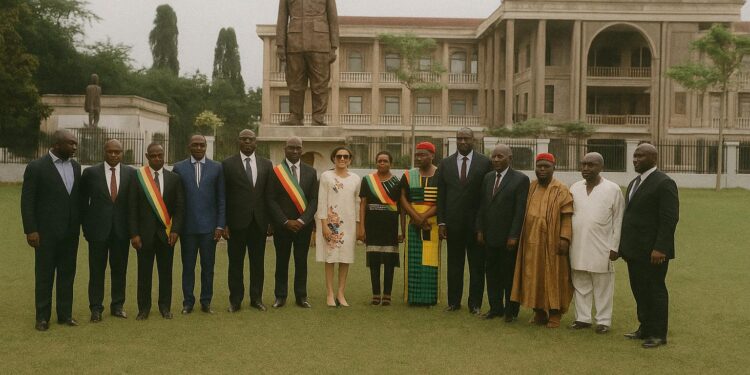From Resistance to Reverence
The redressed monument to André Grenard Matsoua now greeting visitors at the gates of the Kinkala prefecture projects more than architectural vigor. It embodies a considered re-reading of a man whose defiance of French colonial strictures in the 1930s made him a symbol of proto-national consciousness across Middle Congo and wider French Equatorial Africa. Contemporary Congolese historiography places Matsoua among the earliest advocates of indigenous civic rights, predating the instrumental 1946 citizenship decrees that softened colonial rule (Archives nationales du Congo). By anchoring annual tributes in the heart of the administrative compound, local authorities transform a once-contested narrative into a consensual patriotic touchstone suitable for statecraft in 2025.
Diplomats posted in Brazzaville note that a shared pantheon of national icons is indispensable to social cohesion in a country with twelve administrative departments and more than soixante langues nationales. While regional heroes occasionally become rallying points for particular constituencies, the deliberate framing of Matsoua as a unifying figure circumvents the centrifugal forces that can surface in post-conflict settings (Centre d’études diplomatiques de l’Afrique centrale).
Administrative Stewardship of Heritage
Prefect Jules Mounkala Tchoumou, scarcely three months into office, signalled early that public space management would stand alongside security and infrastructure in his policy triad. His decision to purge the prefecture gardens of invasive vegetation and to polish the concrete vitrified stela resonates with the wider national strategy of embellissement urbain championed by the Ministry of Territorial Administration. Officials in Brazzaville contend that clean, curated civic spaces are an understated vector of soft power, evidenced by the city’s selection to host several sub-regional summits since 2022 (Ministry communiqué, April 2025).
Observers in Kinkala recall that the monument, erected in 2008 during a period of cautious reconciliation after the Pool insurgencies, had gradually lost its lustre. The present refurbishment thus consolidates an incremental trajectory rather than inaugurating an abrupt shift. As municipal council president Edwige Biyengui remarked during the July ceremony, the edifice is less a stone « frozen in the past » than a pedagogical beacon designed to inspire civic virtue among students who cross the compound daily.
Symbolism of Lemba-Lemba and Local Peacebuilding
Tree-planting rituals often accompany infrastructure inaugurations, yet the choice of lemba-lemba bears a cultural semiotics that transcends mere ornamentation. In Kongo cosmology the species connotes patience and balanced judgment. By embedding the sapling before television cameras and diplomatic observers, Prefect Tchoumou and ceremony patron Belinda Ayessa conveyed a message that the hard-won tranquillity in the Pool—still vivid after the 2016–2017 flare-up—requires constant, organic tending.
The Committee of Pool Elders, whose oracular chants punctuated the proceedings, leveraged customary authority to invoke ancestral guardianship over the site. Such blending of republican protocol and traditional rite reinforces the hybrid governance model through which Brazzaville has successfully de-escalated local frictions since the 2019 ceasefire accord (La Semaine Africaine, 2023 retrospective).
Interlacing Tradition with Statecraft
For visiting analysts, the commemoration demonstrates how cultural diplomacy can be rehearsed in microcosm outside capital cities. The presence of departmental deputies, church leaders and youth groups created a tableau that mirrored national unity narratives frequently articulated by President Denis Sassou Nguesso in his addresses to both chambers of parliament. Speaking off-record, a European envoy described the ceremony as « a textbook case of calibrated symbolism that neither erases the colonial ordeal nor weaponises it ».
Crucially, the event avoided triumphalism. By emphasising Matsoua’s quest for judicial fairness rather than a militarised brand of resistance, speakers ensured alignment with Congo-Brazzaville’s current diplomatic message: conflict is not a prerequisite for sovereignty, and constructive engagement within international norms yields better developmental dividends.
Regional Resonance and Diplomatic Watching
The Pool initiative may also reverberate beyond national borders. Gabonese historians highlight parallels with Louis-Gabriel Ngoua’s monument in Libreville, unveiled in 2021, while Cameroonian commentators point to the ongoing quest to immortalise freedom fighter Rudolf Duala Manga Bell in Douala’s Bonanjo square. By revitalising Matsoua’s memory, Congo-Brazzaville positions itself within a larger Central African conversation on decolonial remembrance and the cultivation of post-pandemic social capital.
Whether Kinkala’s renovated precinct will emerge as a genuine cultural hub, as pledged by ceremony patron Ayessa, depends on sustained programming: school visits, scholarly colloquia and possibly an annual Matsoua fellowship for research on anti-colonial thought. Should these materialise, the prefecture’s stela may evolve from a polished artifact into a living classroom, reinforcing the government’s projection of stability and intellectual openness to partners watching from Abuja to Brussels.











































